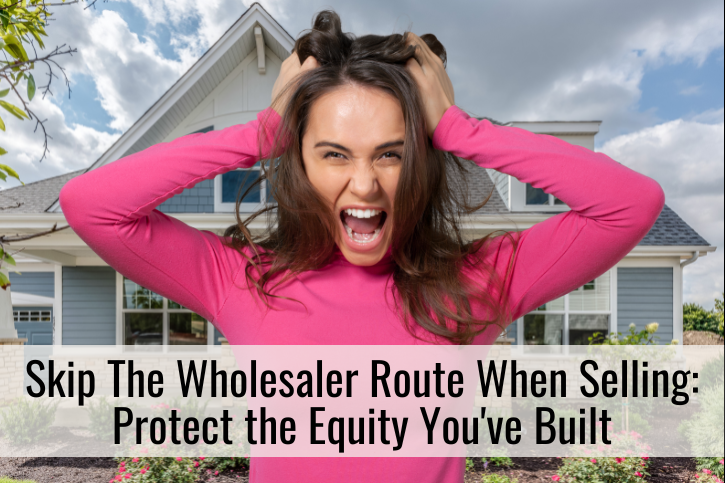When you’re ready to sell your home, your first priority should be protecting the equity you’ve worked so hard to build. That equity is not just a number on paper. It’s real, and it represents years of financial discipline, home maintenance, property appreciation, and personal investment. So why would you hand over a significant chunk of it to someone whose business model relies on skimming it off the top?
Wholesalers are not your friends in this process. In fact, their goal is often directly opposed to yours. They want to acquire your property for as little as possible, often far below what the home is actually worth on the open market. They make their living by taking advantage of sellers who are unaware of how much leverage they truly have. That is why I tell clients plainly: skip the wholesaler route when selling.

What Wholesalers Really Do
To understand why you should steer clear of them, you need to understand their strategy. Wholesalers do not buy homes to live in them. They do not renovate them with care or vision. They are not investors in the traditional sense. Wholesalers are equity skimmers.
Their entire business model revolves around one thing: finding properties they can contract at a price well below market value. Once they have the property under contract, they usually have no intention of purchasing it themselves. Instead, they assign that contract to someone else—a flipper, landlord, or developer—for a higher price. The spread between what they promised to pay you and what their end buyer is willing to pay becomes their profit.
This method may seem harmless at first glance, but it gets worse.
The Long Option Period Game
One of the most manipulative tactics wholesalers use is the extended option period. If you’re unfamiliar with the term, the option period is a negotiated timeframe where the buyer can back out of the deal for any reason. Most traditional transactions have option periods that last 5 to 10 days. Wholesalers often ask for 20 or even 30 days—and they want that time for pennies on the dollar.
Why? Because they are not actually doing inspections or finalizing financing. They are using this window to shop your deal around. They call other investors, list the deal on wholesale buyer networks, and basically auction off your home behind the scenes. All the while, you are off the market, committed to a buyer who is not truly committed to you.
Once that period is almost over, here comes the next move. They’ll come back to you with a list of “unexpected repairs,” exaggerated cost estimates, and dramatic revelations about the condition of your home—many of which they supposedly just discovered. And then comes the ask: they want to lower the price. Sometimes significantly. It’s no coincidence this comes after you’ve already emotionally moved on or started packing. They are counting on you being tired, frustrated, and ready to move forward at any cost.
Wearing You Down, One Conversation at a Time
Let’s talk about the emotional toll. Selling your home can be an emotionally intense experience on its own. Add in repeated requests for access, delayed timelines, renegotiations, and vague excuses, and you have a recipe for seller fatigue. Wholesalers count on this.
They use your emotional exhaustion as a tool. Each time they circle back with another “concern,” they are testing your willpower. They want you to believe that your home is worth less than what you were originally told. They plant the idea that no buyer will want to deal with these issues, that this offer is the best you’ll get, and that you might as well accept the revised terms.
This strategy works more often than it should. Why? Because most homeowners aren’t real estate experts. And that’s exactly what wholesalers are betting on.
The Knowledge Gap That Costs You Thousands
Most homeowners are not steeped in real estate data, local market conditions, or valuation strategy. That is perfectly normal. You shouldn’t have to be. But this knowledge gap becomes dangerous when someone with more information uses it to their advantage.
Wholesalers specifically target homeowners who may be uninformed or in distress. They look for situations where sellers feel overwhelmed or under pressure: inherited homes, pending divorces, job relocations, or financial strain. In these moments, many people are simply looking for a quick and easy sale. That’s what wholesalers promise.
But the ease comes at a high cost—your equity.
What they won’t tell you is how much more your home is worth when marketed properly. They won’t talk about competitive pricing strategies, home staging, or neighborhood comps. They don’t want to involve a real estate agent because an agent can spot an unfair deal from a mile away. And once a professional steps in, the wholesaler’s leverage disappears.
Skip The Wholesaler Route When Selling and Work With a Real Estate Broker
![]() When you partner with a competent and experienced real estate broker, everything changes. You gain insight, clarity, and a true advocate for your financial best interests. An expert broker knows how to price your home appropriately—not based on what someone is willing to gamble, but based on real market data and current buyer demand.
When you partner with a competent and experienced real estate broker, everything changes. You gain insight, clarity, and a true advocate for your financial best interests. An expert broker knows how to price your home appropriately—not based on what someone is willing to gamble, but based on real market data and current buyer demand.
Brokers bring visibility. Your home is listed on the open market, exposed to a wide range of buyers. Not just one wholesaler hoping to flip it, but real families, investors, and homeowners who will compete for your property and potentially drive up the price. Exposure creates demand, and demand creates stronger offers.
You also get protection. Licensed professionals are obligated to act in your best interest, to disclose information, and to keep you informed at every step. You’ll never wonder whether you’ve been taken advantage of or tricked into leaving money on the table. Every decision will be made with your input and based on clear market conditions.
It’s not just about the transaction. It’s about peace of mind.
Here’s What That Looks Like in Practice
You sit down with your broker and talk through your goals. Are you looking to move quickly? Hoping for top dollar? Trying to avoid costly repairs? Together, you come up with a strategy. That might involve minor updates to boost value, strategic pricing to draw in competitive bids, or simply listing the home as-is to reach investors who are actually serious.
From there, the marketing kicks in. Professional photos. Property descriptions that highlight your home’s strongest features. Targeted digital advertising and exposure through the Multiple Listing Service. Everything is designed to get your home in front of as many eyes as possible.
When offers come in, your broker helps you evaluate not just the price, but the terms. Who is serious? Who has cash? Who has an experienced agent on their side? Who’s most likely to close? These are the questions that matter. And your broker knows how to find the answers.
Compare that to a wholesaler, who gives you one number, one contract, and a series of moving goalposts. The difference is night and day.
You Deserve Better Than a Shortcut Sale
There’s no doubt that selling a home can be challenging. But taking the shortcut of a wholesale deal often leads to regret. It’s not just that you’re likely leaving thousands—or even tens of thousands—of dollars on the table. It’s that the process is built on manipulation and imbalance.
I’ve seen too many homeowners tricked into thinking they don’t have better options. That no one else will buy their home because of this repair or that issue. That if they walk away, they’ll never get another offer. That’s simply not true.
There is always another way. And that way starts by saying no to wholesaler tactics and yes to a licensed, local real estate professional.
Let Me Help You Navigate the Right Path
If you’re considering selling your home, or if someone has approached you with a wholesaler offer that sounds too good to be true, take a step back. Get advice from someone whose job is to protect your interests—not to skim your equity.
Skip the wholesaler route when selling. Reach out to me at Uncommon Realty, and let’s have an honest conversation about your goals, your home, and how to get you the best results possible. You deserve transparency, fair value, and a partner who will advocate for you at every turn.
Your home is more than a transaction. It’s your asset, your investment, and in many cases, a piece of your life story. Let’s make sure you treat it that way.






Leave a Reply